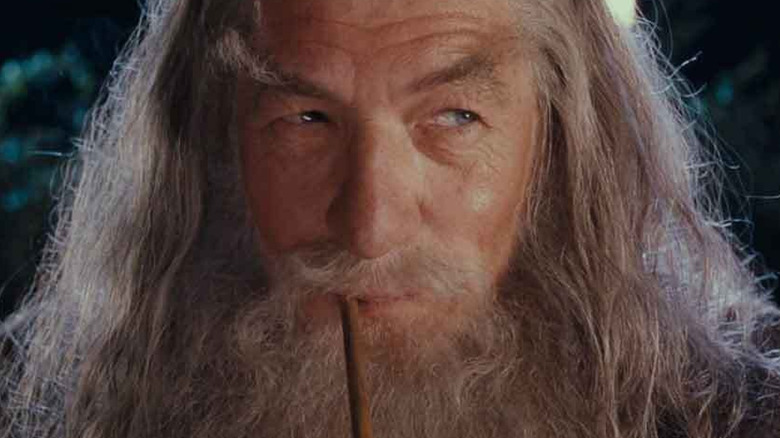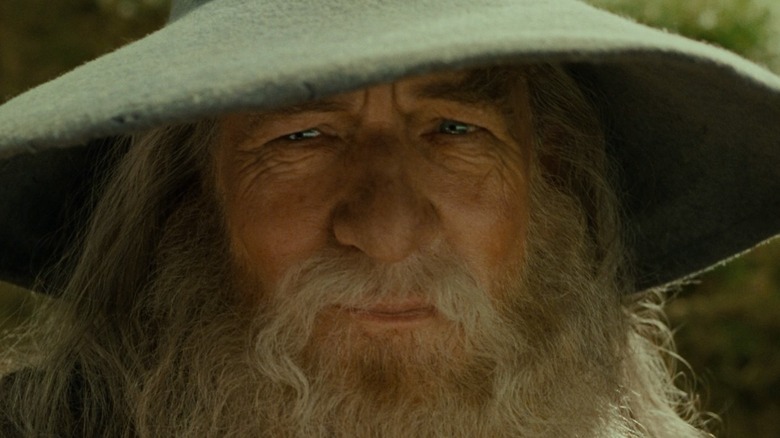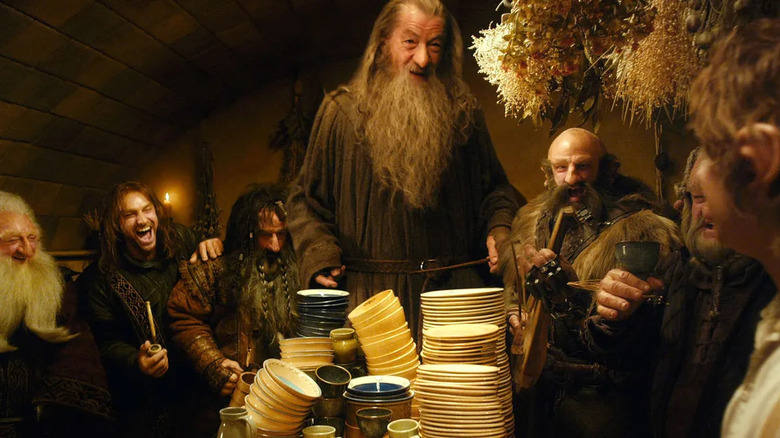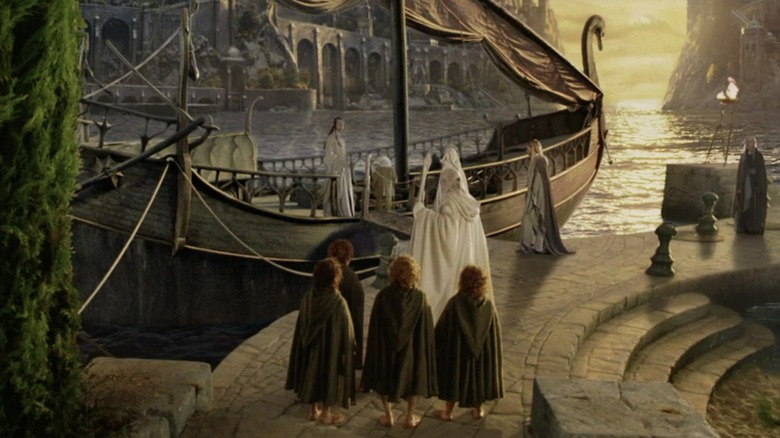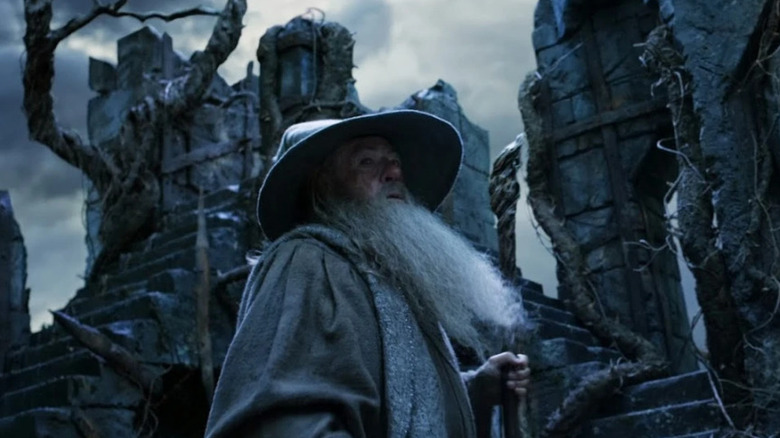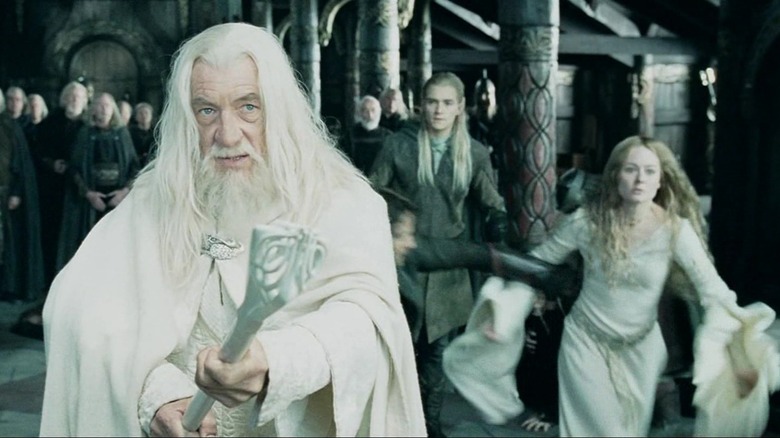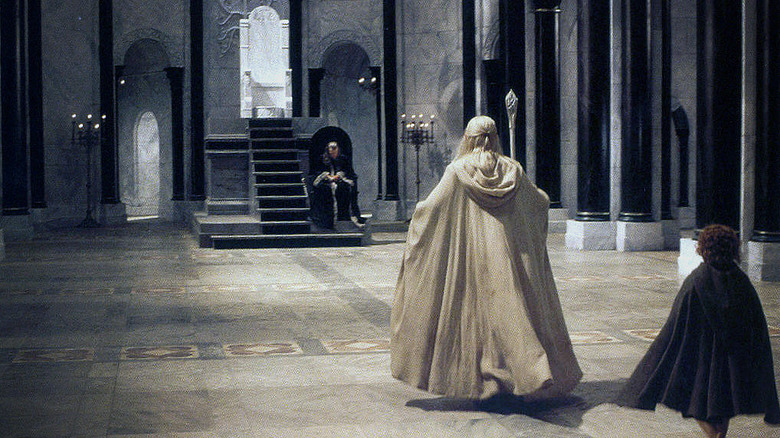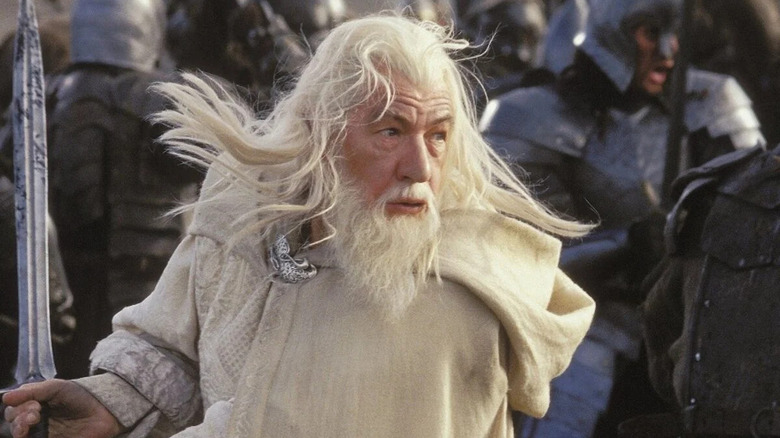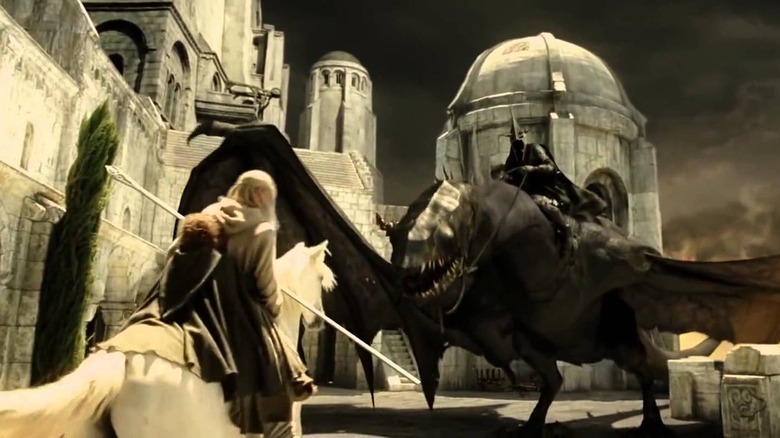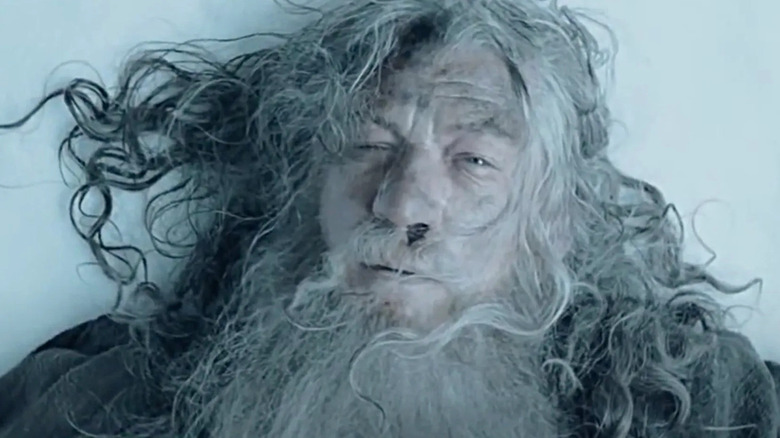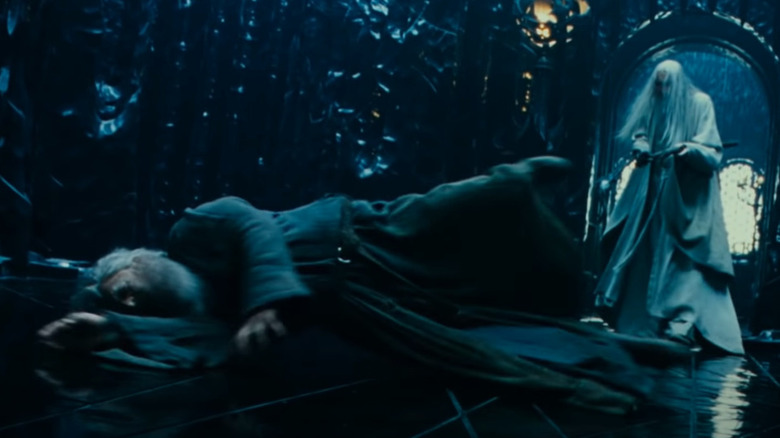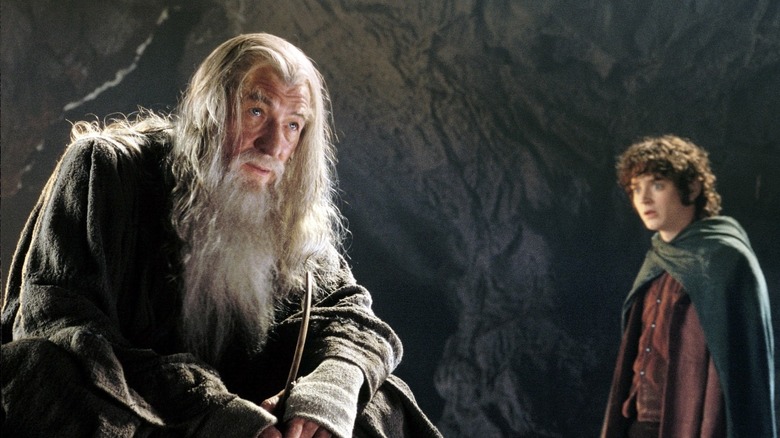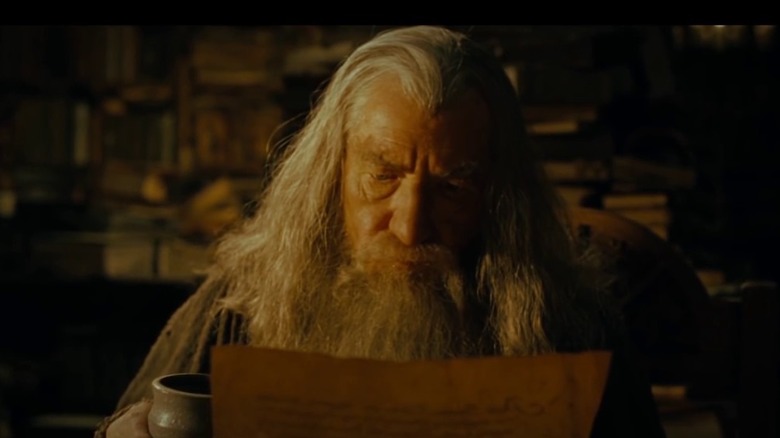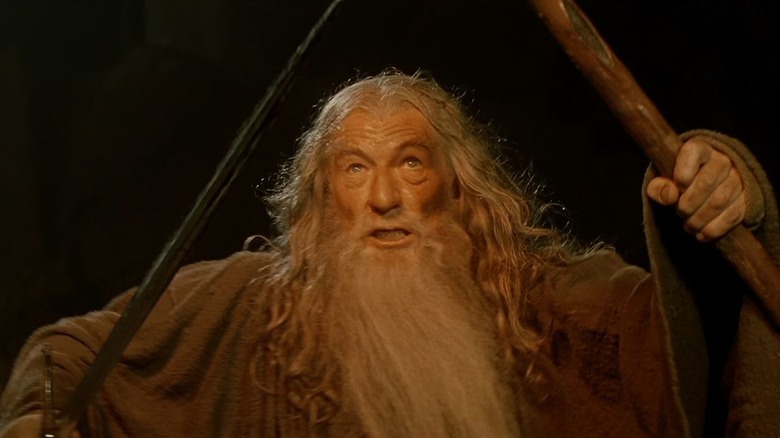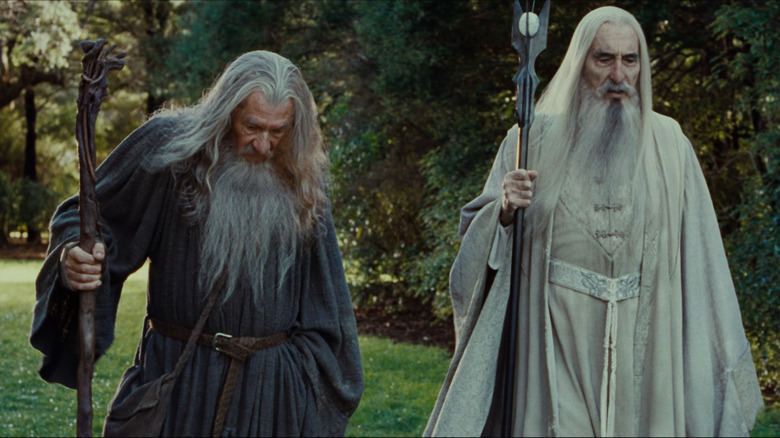Gandalf's 7 Best And 7 Worst Moments In The Lord Of The Rings Franchise
We have a lot of people to thank for the fictional world of Middle-earth and the many rich and sprawling stories that spring from its well. The author and father of modern fantasy himself, J.R.R. Tolkien, gave us his legendarium, which includes "The Hobbit," "The Lord of the Rings," and other various stories and materials. Peter Jackson gave us three magnificent film adaptations in "The Fellowship of the Ring," "The Two Towers," and "The Return of the King" as well as three perhaps not as masterful but still enjoyable "Hobbit" movies. Importantly, a cast and crew of thousands helped bring Tolkien's and Jackson's visions to life, including Sir Ian McKellen, who portrayed the wizard Gandalf in all six installments.
The "Rings" films became so beloved in no small part because of McKellen's definitive performance. Fans and critics praised his efforts at the time of those films' release. He was nominated for Best Supporting Actor for "The Fellowship of the Ring" (arguably his best outing as the character), though he did not win. In retrospect, his work on the two trilogies has become so iconic, it'll probably stand the test of time as one of the most accomplished pieces of literary character interpretation that an actor's ever done. But while it's hard to find fault with the wise, altruistic, and often quite funny wizard, he is (like all of Tolkien's creations) still imperfect. These are Gandalf's most shining and most shameful moments throughout "The Lord of the Rings" franchise.
Best: a wizard arrives
"The Fellowship of the Ring" begins with an extended, dramatic, and helpful prologue in which non-book-reading viewers learn how the One Ring came to exist and what became of it in the intervening years. But the real story gets off to a proper start once we arrive in the Shire. The sumptuous cinematography and production design, along with Howard Shore's transporting score, combine to make Middle-earth feel like a fantastical but tangibly real place. The scene is perfectly set for Gandalf the Grey's big entrance — which McKellen simply nails.
He rolls across a sunlit field in a rickety horse-drawn cart, merrily singing to himself. Frodo approaches at a hill pass and teases, "You're late," to which Gandalf, half hidden under the brim of his hat, proclaims, "A wizard is never late, Frodo Baggins, nor is he early. He arrives precisely when he means to." McKellen and Elijah Wood as the wizard and the hobbit hold back their giggles for as long as they can, but Gandalf breaks first. His charmingly scrunched-up and wrinkled face melts into deep, jolly laughter as he gives Frodo the heartfelt hug of an old friend. This famous line of dialogue is a bit cheeky in a meta sense, but their first meeting in some time is executed so beautifully, it sets a tone for the rest of the film (and indeed, the rest of the trilogy) to succeed in its journey.
Worst: Gandalf throws a party at Bag End
Gandalf has a soft spot for hobbits, especially when he needs a friend to help him save the world. Before he charges Frodo with destroying the One Ring, he enlists Frodo's uncle Bilbo to join him on the very quest during which the Ring comes into Bilbo's possession. Like "Fellowship," "The Hobbit: An Unexpected Journey" kicks off with a visit from the wizard. His intentions might be admirable; he hopes to compel Bilbo to sign on as their "burglar," but he goes about it in a way that most homebody homeowners would find rude to say the least.
The Gandalf that Bilbo meets some 60 years earlier is a little more ornery than the one Frodo encounters. "It'll be very good for you and most amusing for me," he says of what's about to transpire, though he provides the hobbit with exactly no details.
Unbeknownst to Bilbo, Gandalf draws a glowing rune on his door. A dozen Dwarves arrive at Bag End, unaware that they're unannounced. Bilbo just wants to enjoy a fish supper and a quiet evening. The company of Dwarves, however, is an unruly and hungry bunch of visitors. Then Gandalf himself joins the festivities as if nothing is out of the ordinary. The wizard's speech about the world outside of books and maps is inspiring, but if he wanted to be certain Bilbo would take up his cause, he probably shouldn't have imposed so much on his most hesitant adventurer.
Best: a wizard departs
As delightful as Gandalf and Frodo's first scene together in the Shire is, their final scene in "The Return of the King" is even more breathtaking and moving. The White Wizard, a rapidly aged Bilbo, and Frodo, still suffering from his wounds, are bound for the last ship to leave Middle-earth. They intend to join Galadriel and Elrond on a journey to the Undying Lands. But first, Frodo must bid farewell to his dear friends Merry, Pippin, and of course, Sam. It's not an easy goodbye. Gandalf, as steadying and authoritative as ever, helps get them all through their emotional parting. "Well, here at last, dear friends, on the shores of the sea, comes the end of our fellowship in Middle-earth," he tells them. "I will not say 'do not weep,' for not all tears are an evil." The wizard's own eyes are welling up, though his face stretches into a warm and content smile, knowing full well that this is the best possible outcome for all involved.
Frodo explains to his friends that they did what they set out to do — save the Shire — but saved it for them and for future generations of hobbits, and not himself. After a last embrace, he gives Sam the Red Book and walks toward Gandalf's outstretched, welcoming hand. They board the ship together with the indescribable beauty of Valinor in the distance, though Frodo can't help but look back at his lifelong friends before they sail into the glowing horizon.
Worst: Gandalf abandons the company for Dol Gurdur
Throughout the events of "The Hobbit" and "The Lord of the Rings," Gandalf — who clearly feels responsibility for those he's assembled to fight Middle-earth's evils — tries his best to protect his companions from unnecessary danger. As Bilbo and the dwarves leave Beorn's homestead, Gandalf communes with Galadriel. She cautions him to "beware the necromancer" and urges him to investigate. When Gandalf splits from their course, Bilbo protests. "You're not leaving us?" he asks, to which Gandalf replies, "I would not do this unless I had to."
The party of 13 succumbs to the forest of Mirkwood's illusions and, having lost their way, is attacked by spiders that lie in wait there. Bilbo relies upon the Ring and his sword Sting to just barely rescue everyone, only to see the rest of the group captured by elves. Meanwhile, Gandalf isn't faring any better on his side quest, as he and Radagast the Brown discover that the tombs of the Nazgûl are empty. Gandalf's instinct is to return to his friends, but he travels to Dol Guldur instead and compels the evil within to reveal itself by lifting Sauron's spell. Only he's not powerful enough to combat what he's released: Sauron appears in the flaming eye and disintegrates Gandalf's staff before imprisoning him in a cage suspended over the amassing arming of orcs that now infest the ruins. Though he thought it for the best, everyone ends up worse off (at least temporarily) because of his diversion.
Best: the exorcism of Theoden King
One of the best tricks that Gandalf has up his billowing sleeves (as both Gandalf the Grey and Gandalf the White) is seeming like an unassuming old man rather than the powerful magic wielder he really is. He uses this misperception to his advantage in a critical scene in "The Two Towers." Once he's returned as Gandalf the White, he leads Aragorn, Legolas, and Gimli to Edoras, the capital of Rohan, where Théoden King is under the control of Sauron through Gríma Wormtongue and Saruman's maneuvering. Wormtongue tells the guards to de-arm the four travelers before granting them admission into the throne room. Gandalf, disguised as the Grey, convinces one of them to let him keep his staff by demurely uttering, "You wouldn't part an old man of his walking stick, would you?"
When the party comes face to face with a clearly unwell Théoden, Gandalf surmises the evil that's at hand and throws off his grey cape, revealing himself to be Gandalf the White and revealing his walking stick to be his new staff. Gandalf uses the staff to exorcise Saruman's influence from the King, and what follows is an intense battle of wills that plays out mostly through strong acting choices rather than flashy special effects. As the King regains his color and youth, Gandalf's tone softens and warms as he tells Théoden to "breath the free air again, my friend." He presents him with his sword as victorious music swells, and the Fellowship's hopes stay alive for another day.
Worst: diplomacy with Denethor
Though he can be a little rough around the edges, Gandalf is usually adept at diplomacy. He manages to get what he wants in most situations without seeming like he wants anything at all. The wizard is also a champion of the little guy, both figuratively and literally speaking. "It is the small things, everyday deeds of ordinary folk that keeps the darkness at bay," he tells Frodo, which makes it all the more curious that he's so hard on Peregrin (better known as Pippin) Took. Pippin is a bit of a troublemaker (something he and Gandalf have in common), but he's easily the boldest of all the hobbits. He's every bit as selfless as Frodo, too, which he proves at Minas Tirith.
Gandalf reminds Pippin not to mention Boromir's death to his father Denethor, the current ruling Steward of Gondor. They need Denethor to enter the fray against Sauron's armies and mend old divisions with Rohan, beginning with the lighting of the beacons. But Gandalf, who can usually read people and rooms quite well, storms in and is too unfeeling with the already grim, suspicious Steward. It's Pippin who wins him over by telling the grieving father that his eldest son died bravely protecting him. In repayment for Boromir's life, Pippin pledges his own to Gondor's service. It's one of Gandalf's few shortcomings that for much of the trilogy, the wizard doesn't trust Pippin to serve the Fellowship with his own unique gifts.
Best: Gandalf defends Minas Tirith
An increasingly irrational Denethor thinks that his remaining son, Faramir, has died in battle, though Pippin tries to assure him that he's only unconscious. Firm in his resolve that all is lost — he believes his line has ended and that Rohan has forsaken them — Denethor yells for his men to abandon their posts and save themselves. He tries to flee, but Gandalf whacks him in the head with his staff and tells the men to prepare for battle.
The White Wizard takes over command of Gondor's forces. First, he inspires the soldiers to stand their ground — though they're vastly outnumbered — as he rides across the battlements atop Shadowfax and bellows, "Do not give into fear!" He also strategizes on the go. Seeing that Sauron's army below is using trolls to move enormous catapults, he instructs the front line to take them out first. Then, Gandalf himself holds his own against a constantly replenishing army of Orcs once they've breached the city walls. With a sword in one hand and his staff in another, the old wizard singlehandedly fends off about a dozen Orcs with a surprising show of strength, speed, and acrobatics. That is, until Pippin answers the call to arms and leaves the safety of the Citadel just in time to take out the Orc that was approaching Gandalf from behind.
Gandalf's defense of Gondor against all reasonable hope is proof that the White Wizard isn't just clever and good; he's also as capable a leader as any of Middle-earth's stewards or kings.
Worst: the Witch King breaks Gandalf's staff
A scene that only appears in the extended edition of "The Return of the King" shows even more of Gandalf in action at Minas Tirith. However, in this particular instance, he doesn't prevail against a pretty terrifying foe. Pippin alerts Gandalf to the fact that Denethor is about to burn himself and Faramir alive on a ceremonial pyre. They race toward the throne room to stop Denethor, but The Witch-King of Angmar — Sauron's right-hand man — flies into the capital city on the back of a Fell Beast and lands in the middle of their route.
Gandalf raises his staff and commands, "Go back to the abyss! Fall into the nothingness that awaits you and your master!" The Witch-King, whose actual face we cannot see, is unimpressed and asks, "Do you not know death when you see it, old man?" He unsheathes his sword and exclaims in most guttural of voices, "This is my hour!" Gandalf tries to fight back, but — at least in this showdown — he's no match for the leader of the Nazgûl, who knocks him from his horse and destroys his staff. "You have failed," he taunts Gandalf, as he predicts that the world of men will fall. Gandalf (and Faramir, by extension) are saved by the Riders of Rohan, whose call distracts the Witch-King and the Fell Beast long enough for Gandalf and Pippin to collect themselves and escape.
Best: Gandalf defeats the Balrog
One of Gandalf's finest moments is also one of the most stunning scenes in the entire Tolkien cinematic universe, but this moment actually unfolds in two parts, both in flashback. "The Two Towers" starts where "The Fellowship of the Ring" left off, as least as far as Gandalf's story is concerned. We see the wizard hanging on to the rock ledge as he screams, "Fly, you fools!" but the camera stays with him this time as his fingers give way and his body descends at high speed into the infinite depths of Moria. He manages to recover his sword and fight valiantly against the Balrog as they both plunge ever downward. A wide shot of Gandalf and the much bigger, flaming Balrog entwined in a battle to the death shows just how dark and cavernous this part of Tolkien's world really is.
Later in the film, once he's reintroduced himself to Aragorn as Gandalf the White, he finishes the story. He dodged and slashed, he says, "until at last I threw down my enemy and smote his ruin upon the mountainside." The lifeless Balrog smashes into the rock and snow with a deafening thud and an exhausted Gandalf falls onto his back as the wind whips around him. "Darkness took me," he explains, "but it was not the end." The wizard reawakens with a gasp, his wounds having healed, his hair now a neat, uniform white. Luckily for the Fellowship and for all of Middle-earth, he's sent back to finish what he started.
Worst: Saruman defeats Gandalf
For a guy who's thousands of years old and who always defaults to non-violent means of problem-solving first, Gandalf still kicks a lot of butt throughout "The Lord of the Rings" franchise. But he can't win them all, and his most embarrassing defeat comes relatively early in "The Fellowship of the Ring," when he badly miscalculates how his fellow wizard Saruman will react to the news that Frodo has the Ring.
Saruman tells Gandalf that the Nazgûl have already reached the Shire, intending to kill Frodo and reclaim the Ring. It's painfully obvious at this point that the White Wizard has been corrupted by Sauron, no thanks to his own vain, greedy, and jealous vices. Gandalf tries to run for the door, but Saruman shuts all the exits telepathically, trapping him inside. "Against the power of Mordor, they can be no victory," he tells his former friend. "We must join with Sauron." Gandalf rejects Saruman's suggestion, but doesn't stand a chance in the melee that ensues. Saruman uses his magic to toss Gandalf around the tower room like a rag doll. The Grey Wizard gets in one blow before the White Wizard commandeers his staff and uses both their staffs to twist Gandalf's body and torture him into submission.
Saruman propels his victim, battered and bloodied, to the top of the Tower of Orthanc, where he's held as prisoner and can't keep his promise to meet up with Frodo and company.
Best: Gandalf the Wise
Gandalf is one of those few characters from literature and pop culture whose dialogue is so quotable, people who haven't read the books or watched the movies have still heard of or even referenced his wisdom. One particular notion stands out from the rest and practically serves as a thesis statement for Tolkien's worldview. Two scenes — one from "An Unexpected Journey" and one from "The Fellowship of the Ring" — encapsulate how Gandalf feels about the power that some beings hold over others. The conversations are so similar (and so affecting and well-acted) that it's impossible to choose.
After Gandalf presents Bilbo with the sword he'll name Sting, he tells him, "True courage is about knowing not when to take a life but when to spare one." This exchange, unique to the film, ties into an even more memorable moment that Gandalf and Frodo share. The latter is lamenting that he ever came into contact with the Ring, adding that it's a pity that his uncle hadn't slain Gollum when he had the chance. It's here that the Wizard delivers his most profound speech, which is adapted from the books. "It was pity that stayed Bilbo's hand," he explains. "Many that live deserve death. Some that die deserve life. Can you give it to them, Frodo? Do not be too eager to deal out death in judgment." Gandalf's empathy, restraint, and humility are the very virtues that make him so good and wise, and he helps Middle-earth most by imparting these virtues to our protagonists, Bilbo and Frodo.
Worst: Gandalf the procrastinator
One might expect a wise wizard to make frequent trips to archives and libraries, as Gandalf does after he visits Bag End at the beginning of "The Fellowship of the Ring." But the late hour at which Gandalf finally decides to research what, specifically, might be in Bilbo's pocket is odd if not downright irresponsible. Peter Jackson's "Hobbit" trilogy ends as Gandalf strongly implies that he knows what Bilbo happened upon during their adventure. It's not clear whether he suspects Bilbo's ring was the One Ring or just a Ring of Power, but the items are so rare that even in the second case, it doesn't stand to reason he'd simply let the matter go.
When he arrives back at the Shire decades later for Bilbo's birthday, he finally becomes invested enough to read up on the history of the rings and determine that the gold band is, indeed, Sauron's One Ring. What's even more concerning is that the Shire has been vulnerable all along. Gollum either suspects or knows for certain that Bilbo is the one who made off with his precious. Sauron's forces could get that information out of him, and the last name Baggins puts their home at serious risk. The wizard is usually a step or more ahead of his adversaries, but the lackadaisical attitude he has for 60 years makes him seem like something of a procrastinator in the face of apocalyptic evil.
Best: You shall not pass
If there's one scene fans remember from "The Lord of the Rings" movies, it's this one. Sure, it's part of his epic battle with the Balrog, but this precise line reading is so iconic, it deserves its own spot. Earlier in "The Fellowship of the Ring," when the party must choose which way to go, Gandalf repeatedly argues that they should avoid the Mines of Moria at all costs. But when their mountain pass is ambushed by Saruman, the wizard leaves the decision to Frodo. It's his ring now, and thus his quest after all. Frodo chooses the mines, and though Gandalf is visibly distressed by this, he acquiesces.
Just as Gandalf warned, the members of the Fellowship sense evil once they venture into Moria. After the party races across a narrow stone bridge that hovers over the bottomless Black Pit, the evil of which Gandalf spoke and the source of his fear reveals itself in a bloom of fire. The Balrog of Morgoth lurks in its depths, a demon that Gandalf tells his companions they cannot handle, no matter how brave they are. He stays in the middle of the bridge, lights up his staff, and chants incantations as the Balrog prepares to attack. "Go back to the shadow," he commands as it produces a whip of flames. The Grey Wizard holds his sword and staff together, and lets out that majestic bellow: "You shall not pass!" It's not just one of the best moments in "The Lord of the RIngs," it may be one of the best movie moments of all time.
Worst: He'll know what to do
Gandalf is an invaluable resource to the Fellowship, but he makes one nearly fatal mistake that almost dooms the quest to destroy the One Ring even before it begins. The wizard parts with Frodo and instructs him to meet up with him at the Prancing Pony, where he insists the hobbit and the Ring will be safe. "I must see the head of my order," he says. "He is both wise and powerful. Trust me Frodo, he'll know what to do." Gandalf means Saruman, his old friend and fellow wizard who currently resides in Isengard.
The Grey and White Wizards reunite and talk, with Gandalf speaking openly to Saruman about what he's learned regarding the Ring as well as his plan to stop Sauron from reemerging. Gandalf thinks they still have time to act, but Saruman replies, "What time do you think we have?" It turns out, his wise and trusted friend knows far more about the Ring and Sauron's return than Gandalf has gleaned from hobbits and scrolls. That he loses his fight with Saruman is unfortunate, but that he willingly shares so much intel with the enemy is a much more consequential blunder. Gandalf is almost never flat-out wrong, but in this instance, he's so clueless that his words to Frodo are embarrassingly ironic. Perhaps, as Saruman puts it, he didn't have the wits to see it because his love of the halflings' leaf has slowed his mind.
